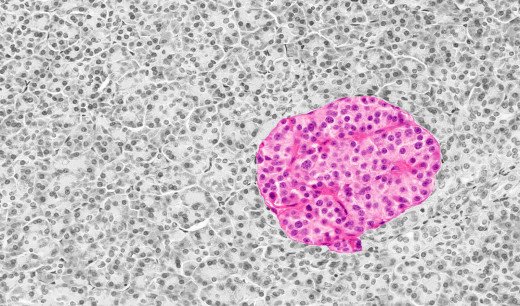As the only source of insulin in our bodies, the pancreas’s beta cells must accurately sense the levels of glucose in the blood and respond by releasing just the right amount of insulin.
Type 2 diabetes ensues when beta cells malfunction and can’t secrete enough insulin to match the body’s increasing needs.
Understanding how beta cells release insulin—and how they malfunction—could lead to better treatments for diabetes.
Background
About 100 variants in the human genome have been linked to type 2 diabetes, yet only a few genes associated with those variants have been identified.
The causative genes have been difficult to identify because most of the variants occur in regulatory regions far away from genes. In such cases, it can be difficult to determine the gene impacted by the variant.
Using a combination of chromatin immunoprecipitation studies, RNA analysis, and comparison of human and experimental animal data on super-enhancers (chromosomal loci with ability to regulate important cellular processes through hubs of transcription factors), the researchers—led by Taiyi Diana Kuo, PhD, and Domenico Accili, MD—identified a previously unknown gene, C2cd4a, which they proceeded to functionally analyze with genetically engineered animal models.
The Findings
The experiments showed that the newly discovered gene, C2cd4a, plays an important role in insulin secretion.
When the C2cd4a gene was removed from the beta cells of mice, the cells could not secrete enough insulin to meet the mouse’s demands, similar to the way cells behave in people with type 2 diabetes.
C2cd4a impacts insulin secretion by suppressing certain genes that are “disallowed” in normal beta cells. (If these disallowed genes are active, beta cells cannot accurately measure the amount of glucose in the blood and therefore cannot secrete the right amount of insulin).
The Larger Picture
Since C2cd4a regulates insulin secretion, it may be an attractive new target for diabetes therapies.
The techniques that Kuo developed to identify C2cd4a provide a blueprint that other researchers can follow to identify still hidden genes associated with type 2 diabetes and other complex diseases.
References
More Information
Taiyi Diana Kuo, PhD, is an associate research scientist in the Department of Medicine, Columbia University Vagelos College of Physicians and Surgeons.
Domenico Accili, MD, is the Russell Berrie Foundation Professor of Diabetes and director of the Columbia University Diabetes and Endocrinology Research Center.
The paper, “Identification of C2CD4A as a human diabetes susceptibility gene with a role in beta-cell insulin secretion,” was published Oct. 1 in Proceedings of the National Academy of Sciences.
Other authors: Michael J. Kraakman (Columbia University Irving Medical Center), Manashree Damle (University of Pennsylvania), Richard Gill (CUIMC), and Mitchell A. Lazar (University of Pennsylvania).
The research was supported by grants from the NIH (T32DK07328, K01DK114372, DK64819, and DK63608) and by the JPB Foundation.
Domenico Accili is cofounder and director of Forkhead Biotherapeutics Corp. and an Advisory Board Member to Eli Lilly and Co.


